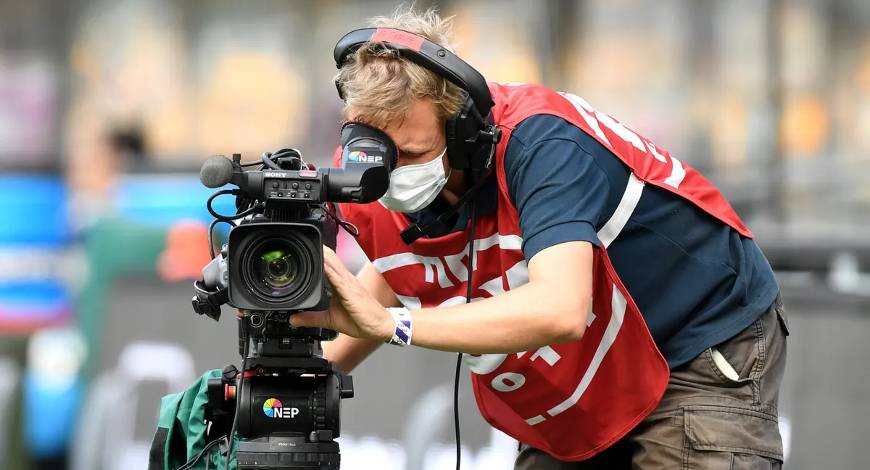International Circuit
‘No diminution’: Federal government intervenes on AFL broadcast rights talks

The federal government has issued an unprecedented warning to the AFL, asking it to keep live matches on free-to-air television as negotiations for its lucrative broadcast rights enter the final weeks.
Communications Minister Michelle Rowland asked the AFL Commission to keep matches freely available amid an ongoing review of laws designed to keep major sporting and cultural events free for the public. The comments, which are highly unusual from a federal government, could delay or significantly alter where AFL games are aired and how much money the sport receives.
“I note reports AFL media rights negotiations have entered their final stages,” Rowland said. “I encourage the AFL Commission and its broadcast and streaming partners to ensure there is no diminution in the availability of AFL matches on free-to-air television under the new deal.”
The AFL is in advanced discussions over its next broadcast rights deal, which it hopes will deliver a record figure that will allow it to invest in the game and its players. While media sources last week said the league was still in discussions with other bidders, including Nine Entertainment Co (owner of this masthead) and Paramount, owner of Network Ten, the AFL is seriously considering a renewed deal with its incumbents.
Foxtel last week backed down and let Seven stream the games it broadcasts on free-to-air on its online service, 7Plus, which was a point of tension between the two parties. Senior executives at Foxtel were frustrated by the AFL’s decision to grant Seven its wish, even though it is expected to receive a “Super Saturday” in exchange. A Super Saturday would give Foxtel the exclusive rights to home-and-away rounds broadcast on that day.
This masthead has since reported the AFL was considering delaying two free-to-air matches each week by up to two hours in interstate markets to give Foxtel more exclusivity for its streaming service Kayo Sports under the proposal.
If approved, it would mean NSW, Queensland, South Australia and Western Australia could face a 30 per cent to 40 per cent reduction in live matches on free-to-air television, a move that would be fiercely opposed by clubs and state governments who want local games to be broadcast exclusively and free-to-air. Seven fiercely opposes the suggestion on the grounds it would hurt fans and significantly reduce the value of its own rights and deprive the public.
Government commentary on a commercial negotiation between a media company and sports administrator is unusual, but unsurprising given Anthony Albanese’s election commitment.
Labor made a pre-election pledge to change anti-siphoning laws to restrict global streaming services from bidding for major sporting events such as the AFL and Australian Open before free-to-air broadcasters have the chance to do so.
The AFL broadcast rights are a test of Australia’s anti-siphoning laws, which were created in the early 1990s when streaming services did not exist and Foxtel was the major cable TV provider. The laws include a list – determined by the communications minister – of key sports and cultural events that should be available for free. For decades, this has prevented Foxtel from acquiring rights to certain programs ahead of a free-to-air network.
But in 2022, Nine, now the owner of this masthead, is the parent company of local streaming service Stan. Stan is the main broadcaster of rugby union matches and shares games on the anti-siphoning list with its parent company Nine. Free-to-air rival Network Ten is controlled by CBS, which owns Paramount+, a local streaming service which broadcasts the A-League and W-League matches.
Foxtel boss Patrick Delany said this month the laws allow free-to-air television owners to get ahead of the Murdoch-controlled pay TV company and acquire all the rights to a sport with no requirement to air the games for free (Stan is owned by Nine Entertainment Co and Paramount owns Channel Ten).
“It’s a fact that [the TV networks] don’t acquire free rights alone, they acquire free and paid rights, and they exploit them, and they push customers over to the paid side,” he said.
But the laws also do not prevent Foxtel from have a period of exclusivity on key matches ahead of a free-to-air network. Foxtel wants more exclusive content in return for paying millions more to the AFL each year – it already contributes most of the $946 million that the AFL receives in broadcast fees under the current deal. It has pledged to make key sports matches available for free on Kayo Sports if the laws were reformed.
Free TV Australia, the lobby group for commercial broadcasters Seven, Ten and Nine, has long advocated for the laws to include global services to allow the public free access to major events. The government has made a review of the scheme a priority.
“The Albanese government is committed to reviewing the anti-siphoning scheme to give all Australians the chance to enjoy live and free events of national and cultural significance,” Rowland said.
“The review will be conducted in a consultative manner. A discussion paper will be released in the coming weeks to provide all relevant stakeholders, including media and sports, with the opportunity to share their views. They will all be well-heard.”
The three commercial television networks welcomed Rowland’s comments on Wednesday and a review of the anti-siphoning scheme. Seven chief executive James Warburton, who has been the most vocal on anti-siphoning issues in recent weeks, said the company would “fight fiercely” for Australians to watch sport for free.
A Nine spokesperson said the company supported plans to expedite the anti-siphoning review, while a Paramount spokesperson said the company agreed Australians should be able to watch sport free. Foxtel and the AFL declined to comment on Rowland’s remarks. WA Today





